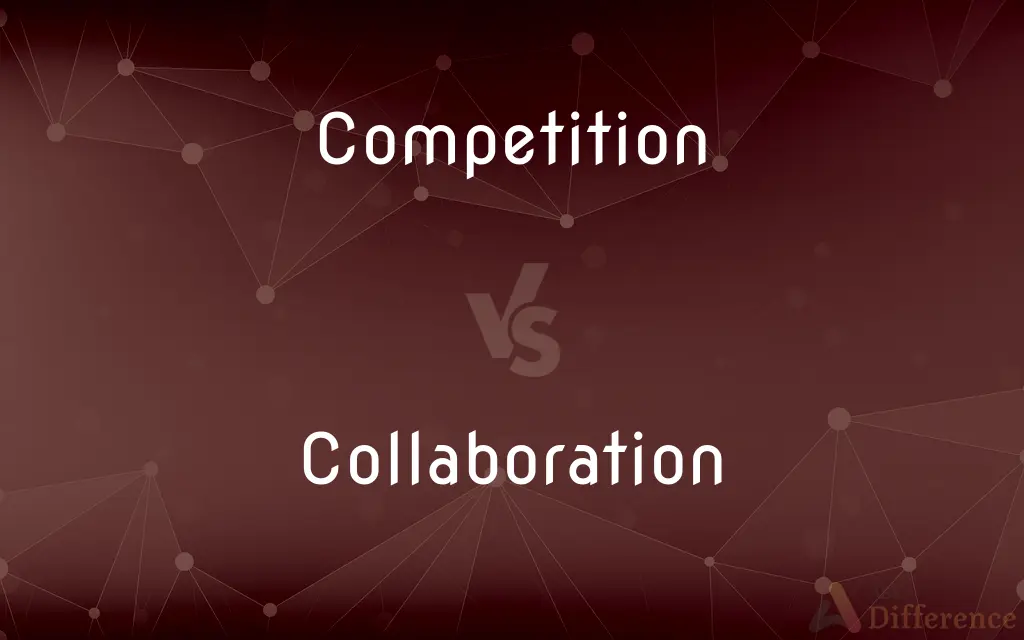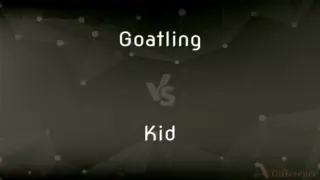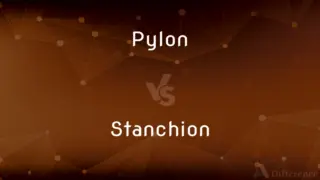Competition vs. Collaboration — What's the Difference?
By Tayyaba Rehman & Urooj Arif — Updated on April 4, 2024
Competition involves individuals or groups working against each other to achieve a goal, focusing on winning or superiority. Collaboration emphasizes working together towards a common goal, valuing collective success over individual achievement.

Difference Between Competition and Collaboration
Table of Contents
ADVERTISEMENT
Key Differences
Competition is characterized by a scenario where individuals or entities strive to outperform each other, aiming for supremacy or greater rewards. This dynamic often leads to innovation and efficiency as competitors seek to gain an edge. On the other hand, collaboration involves participants working jointly towards a shared objective, fostering a sense of community and mutual benefit. The emphasis is on pooling resources, knowledge, and skills to achieve a common goal.
In competition, success is often measured by comparing one's performance against others, highlighting differences in achievement and capability. This can motivate individuals to push their limits and strive for excellence. Whereas in collaboration, success is gauged by the collective achievement and the synergistic outcome produced by the group's efforts. The process values each participant's contribution towards the shared objective, regardless of individual prowess.
Competitive environments can stimulate creativity and prompt individuals to find innovative solutions to stand out. This dynamic can lead to significant advancements and breakthroughs within fields or industries. Conversely, collaboration encourages the sharing of ideas and strategies, leveraging diverse perspectives to solve complex problems more effectively than individuals working in isolation.
While competition can lead to improved personal skills and resilience as individuals seek to overcome challenges independently, it can also foster environments of stress and conflict when not managed properly. Collaboration, on the other hand, cultivates communication and interpersonal skills, promoting a culture of support and understanding among participants.
The choice between competition and collaboration often depends on the context and desired outcomes. In some situations, competition is the driving force behind growth and progress, while in others, collaboration is essential for achieving objectives that require combined efforts and resources.
ADVERTISEMENT
Comparison Chart
Goal
Outperform others to achieve superiority.
Work together towards a common goal.
Measurement of Success
Based on individual or team performance comparison.
Based on collective achievements.
Motivation
Winning, recognition, and personal achievement.
Mutual benefit, shared success.
Key Qualities
Independence, ambition, resilience.
Cooperation, communication, mutual respect.
Outcome
Individual advancement, innovation.
Synergistic outcomes, shared success.
Compare with Definitions
Competition
The rivalry among businesses for consumer dollars.
Competition between brands often leads to better products for consumers.
Collaboration
A partnership or alliance formed to achieve a shared objective.
The collaboration between the two companies resulted in a groundbreaking new product.
Competition
A contest for supremacy or reward among parties.
The annual spelling bee is a competition that encourages students to improve their spelling skills.
Collaboration
A creative process involving two or more people working together.
The collaboration between the artists produced a stunningly original work.
Competition
The act of striving against others for the purpose of achieving a goal.
Competition in the marketplace drives companies to innovate.
Collaboration
The act of working jointly towards a common goal.
Collaboration among team members led to the project's success.
Competition
An environment or situation characterized by conflict or struggle.
The competition for the job was fierce, with over a hundred applicants.
Collaboration
Cooperative interaction among groups, especially in research or innovation.
Their collaboration has advanced scientific understanding in the field.
Competition
The biological struggle for resources among organisms.
In nature, competition for water and nutrients affects plant growth.
Collaboration
The process of sharing knowledge, learning, and building consensus.
Collaboration in the classroom can enhance students' learning experiences.
Competition
Competition is a rivalry where two or more parties strive for a common goal which cannot be shared: where one's gain is the other's loss (an example of which is a zero-sum game). Competition can arise between entities such as organisms, individuals, economic and social groups, etc.
Collaboration
Collaboration is the process of two or more people, entities or organizations working together to complete a task or achieve a goal. Collaboration is similar to cooperation.
Competition
The act of competing, as for profit or a prize; rivalry.
Collaboration
The action of working with someone to produce something
He wrote a book in collaboration with his son
Competition
A test of skill or ability; a contest
A skating competition.
Collaboration
Traitorous cooperation with an enemy
He faces charges of collaboration
Competition
Rivalry between two or more businesses striving for the same customer or market.
Collaboration
To work together, especially in a joint intellectual effort.
Competition
A competitor
The competition has cornered the market.
Collaboration
To cooperate treasonably, as with an enemy occupation force in one's country.
Competition
(Ecology) The simultaneous demand by two or more organisms for a limited environmental resource, such as nutrients, living space, or light.
Collaboration
(uncountable) The act of collaborating.
Collaboration can be a useful part of the creative process.
Competition
(uncountable) The action of competing.
The competition for this job is strong.
Collaboration
(countable) A production or creation made by collaborating.
The husband-and-wife artists will release their new collaboration in June this year.
Competition
(countable) A contest for a prize or award.
The newspaper is featuring a competition to win a car.
Collaboration
(uncountable) Treasonous cooperation.
He has been charged with collaboration.
Competition
The competitors in such a contest.
The new stain remover was ten times more effective than the competition.
Collaboration
The act of working together; united labor.
Competition
The act of seeking, or endeavoring to gain, what another is endeavoring to gain at the same time; common strife for the same objects; strife for superiority; emulous contest; rivalry, as for approbation, for a prize, or as where two or more persons are engaged in the same business and each seeking patronage; - followed by for before the object sought, and with before the person or thing competed with.
Competition to the crown there is none, nor can be.
A portrait, with which one of Titian's could not come in competition.
There is no competition but for the second place.
Where competition does not act at all there is complete monopoly.
Collaboration
The act of willingly cooperating with an enemy, especially an enemy nation occupying one's own country.
Competition
A business relation in which two parties compete to gain customers;
Business competition can be fiendish at times
Collaboration
Act of working jointly;
They worked either in collaboration or independently
Competition
An occasion on which a winner is selected from among two or more contestants
Collaboration
Act of cooperating traitorously with an enemy that is occupying your country
Competition
The act of competing as for profit or a prize;
The teams were in fierce contention for first place
Competition
The contestant you hope to defeat;
He had respect for his rivals
He wanted to know what the competition was doing
Common Curiosities
Can competition lead to innovation?
Yes, competition can stimulate individuals or groups to innovate in order to gain an advantage.
How do competition and collaboration differ in goal orientation?
Competition focuses on individual or group superiority, while collaboration emphasizes a collective approach towards shared objectives.
What is collaboration?
Collaboration is the act of working together with one or more people to achieve a common goal.
What is competition?
Competition is a scenario where individuals or groups strive to achieve goals by outperforming each other.
How does collaboration benefit problem-solving?
Collaboration brings diverse perspectives and resources together, enhancing the ability to solve complex problems.
How does collaboration impact team dynamics?
Collaboration strengthens team dynamics through improved communication, mutual respect, and shared successes.
What skills are important for successful competition?
Key skills include ambition, resilience, and the ability to innovate and adapt.
Can competition and collaboration coexist in the same environment?
Yes, many environments successfully integrate both competition and collaboration to maximize benefits.
What is the impact of competition on stress levels?
Competition can increase stress levels, especially if perceived as threatening or excessively challenging.
How does collaboration contribute to a positive work culture?
Collaboration contributes to a positive work culture by promoting support, understanding, and mutual respect among participants.
Is competition always negative?
No, competition can be positive when it encourages individuals to improve their skills and achieve excellence.
Can collaboration lead to better learning outcomes in education?
Yes, collaboration can enhance learning by facilitating peer support, diverse viewpoints, and active engagement.
What skills are crucial for effective collaboration?
Essential skills include communication, cooperation, and the ability to listen and integrate diverse viewpoints.
How do competition and collaboration affect market innovation?
Competition drives market innovation through the desire to gain competitive advantage, while collaboration can accelerate innovation by combining resources and knowledge.
How do competition and collaboration influence creativity?
Competition can drive creativity through the desire to stand out, while collaboration fosters creativity through shared ideas and perspectives.
Share Your Discovery

Previous Comparison
Goatling vs. Kid
Next Comparison
Pylon vs. StanchionAuthor Spotlight
Written by
Tayyaba RehmanTayyaba Rehman is a distinguished writer, currently serving as a primary contributor to askdifference.com. As a researcher in semantics and etymology, Tayyaba's passion for the complexity of languages and their distinctions has found a perfect home on the platform. Tayyaba delves into the intricacies of language, distinguishing between commonly confused words and phrases, thereby providing clarity for readers worldwide.
Co-written by
Urooj ArifUrooj is a skilled content writer at Ask Difference, known for her exceptional ability to simplify complex topics into engaging and informative content. With a passion for research and a flair for clear, concise writing, she consistently delivers articles that resonate with our diverse audience.














































